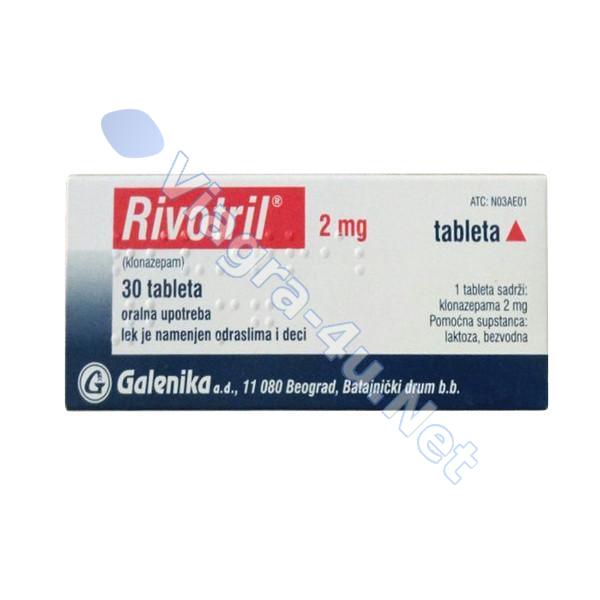General information
Rivotril 2mg, an international brand name for CLONAZEPAM, is used in the treatment of seizure disorders, epilepsy and panic disorder. It has also been used for restless leg syndrome, neuralgia, multifocal tic disorder, posttraumatic stress disorder, parkinsonian dysarthria, social phobia, bipolar disorder and as an adjunct in treatment of schizophrenia.
Rivotril (Clonazepam) 2mg belongs to the class of medications called benzodiazepines. In general, benzodiazepines are used as a sedative or to decrease seizures or anxiety. Clonazepam is used to treat seizure disorders. It helps by slowing the activity of the nerves in the brain (i.e., the central nervous system).
Benefits of Clonazepam
Individuals using Rivotril (Clonazepam) 2mg for medical purposes can find many benefits from the drug, if they take it as directed. CLONAZEPAM has the ability to decrease feelings of nervousness, tension, and anxiety and provide the user with an overall calming sensation. This benefits many individuals who struggle with disorders that keep them feeling overly-aroused or on-edge. Managing these symptoms can improve a person’s social life as well as their ability to perform at work, improving their overall livelihood and wellbeing. When used as directed, Rivotril (Clonazepam) 2mg can help an individual function more normally and enjoy life.
Directions
The dose of clonazepam is determined based on how much is needed to control seizures and varies from person to person. It is important that the dose be individualized to your specific needs to avoid decreased coordination or excessive drowsiness.
The recommended adult starting dose of clonazepam should not be greater than 1.5 mg per day in 3 divided doses. This helps to minimize drowsiness and other side effects. Your doctor will gradually increase the dose until your seizures are controlled. The recommended maintenance dose for adults is 8 mg to 10 mg per day in 3 divided doses.
For children up to 10 years old or who weigh 30 kilograms or less, the dose is based on body weight. The starting dose should be calculated as 0.01 mg per kilogram of body weight per day to 0.03 mg per kilogram of body weight per day, divided into 2 or 3 doses. The maximum starting dose should be no more than 0.05 mg per kilogram of body weight per day. The doctor will gradually increase the dose until the child’s seizures are controlled. Generally, the maintenance dose is between 0.1 mg per kilogram and 0.2 mg per kilogram of body weight.
CLONAZEPAM may be taken with food or on an empty stomach. Avoid drinking grapefruit juice while you are taking this medication as it can increase the levels of clonazepam in your blood.
Many things can affect the dose of a medication that a person needs, such as body weight, other medical conditions, and other medications. If your doctor has recommended a dose different from the ones listed here, do not change the way that you are taking the medication without consulting your doctor.
It is important to take this medication exactly as prescribed by your doctor. If you miss a dose, take it as soon as possible and continue with your regular schedule. If it is almost time for your next dose, skip the missed dose and continue with your regular dosing schedule. Do not take a double dose to make up for a missed one. If you are not sure what to do after missing a dose, contact your doctor or pharmacist for advice.
Possible side effect
Many medications can cause side effects. A side effect is an unwanted response to a medication when it is taken in normal doses. Side effects can be mild or severe, temporary or permanent.
The following side effects have been reported by at least 1% of people taking Clonazepam. Many of these side effects can be managed, and some may go away on their own over time.
Many of these side effects can be managed, and some may go away on their own over time.
Contact your doctor if you experience these side effects and they are severe or bothersome. Your pharmacist may be able to advise you on managing side effects.
- clumsiness or unsteadiness
- delayed reaction
- dizziness or lightheadedness
- drowsiness
- increased watering of the mouth
- muscle weakness
- unusual tiredness or weakness
- Although most of the side effects listed below don't happen very often, they could lead to serious problems if you do not seek medical attention.
Check with your doctor as soon as possible if any of the following side effects occur:
- abnormal thinking (disorientation, delusions, or loss of sense of reality);
- anxiety;
- behaviour changes (e.g., aggressiveness, agitation, unusual excitement, nervousness, or irritability);
- confusion;
- convulsions (seizures);
- cough;
- hallucinations (hearing or seeing things that aren't there);
- increased falls;
- memory loss of recent events;
- nightmares or trouble sleeping;
- signs of depression (e.g., poor concentration, changes in weight, changes in sleep, decreased interest in activities, thoughts of suicide).
Contraindications for Clonazepam
Who should not take Clonazepam?
The following conditions are contraindicated with this drug. Check with your physician if you have any of the following:
conditions:
- porphyria;
- having thoughts of suicide;
- alcohol intoxication;
- drug abuse;
- depression;
- wide-angle glaucoma;
- closed angle glaucoma;
- decreased lung function;
- chronic lung disease;
- liver problems;
- severe liver disease;
- Temporarily Stops Breathing While Sleeping;
- abnormal liver function tests;
- Susceptible to Breathing Fluid Into Lungs;
- pregnancy;
- kidney disease with likely reduction in kidney function;
- allergic reaction to any other benzodiazepine (e.g., lorazepam, diazepam, oxazepam).
Drug Interactions
What other drugs could interact with this medication?
There may be an interaction between clonazepam and any of the following:
- abiraterone acetate;
- alcohol;
- antihistamines (e.g,. cetirizine, doxylamine, diphenhydramine, hydroxyzine, loratadine);
- antipsychotics (e.g., chlorpromazine, clozapine, haloperidol, olanzapine, quetiapine, risperidone);
- aprepitant;
- azelastine;
- "azole" antifungals (e.g., itraconazole, ketoconazole, voriconazole);
- barbiturates (e.g., butalbital, phenobarbital);
- benzodiazepines (e.g., alprazolam, diazepam, lorazepam);
- bicalutamide;
- boceprevir;
- bosentan;
- brimonidine;
- buspirone;
- calcium channel blockers (e.g., amlodipine, diltiazem, nifedipine, verapamil);
- chloral hydrate;
- clonidine;
- cobicistat;
- conivaptan;
- crizotinib;
- dabrafenib;
- dasatinib;
- deferasirox;
- dronedarone;
- efavirenz;
- entacapone;
- enzalutamide;
- general anesthetics (medications used to put people to sleep before surgery) grapefruit juice;
- HIV non-nucleoside reverse transcriptase inhibitors (e.g., delavirdine, efavirenz, etravirine, nevirapine);
- HIV protease inhibitors (e.g., atazanavir, indinavir, ritonavir, saquinavir);
- imatinib;
- kava kava;
- macrolide antibiotics (e.g., clarithromycin, erythromycin);
- magnesium sulfate;
- methadone;
- mifepristone;
- mirtazapine;
- mitotane;
- modafinil;
- muscle relaxants (e.g., baclofen, cyclobenzaprine, methocarbamol, orphenadrine);
- narcotic-containing medications (e.g., codeine, oxycodone, morphine);
- nabilone;
- nefazodone;
- norfloxacin;
- olopatadine;
- pramipexole;
- proton pump inhibitors (e.g., lansoprazole, omeprazole);
- rifabutin;
- rifampin;
- ropinirole;
- St. John's wort;
- scopolamine;
- seizure medications (e.g., clobazam, carbamazepine, levetiracetam, phenobarbital, phenytoin, primidone, topiramate, valproic acid, zonisamide);
- selective serotonin reuptake inhibitors (SSRIs; e.g., citalopram, duloxetine, fluoxetine, paroxetine, sertraline);
- siltuximab;
- simeprevir;
- tapentadol;
- tetrahydrocannabinol;
- thalidomide;
- theophyllines (e.g., aminophylline, oxtriphylline, theophylline);
- tocilizumab;
- tolcapone;
- tramadol;
- tricyclic antidepressants (e.g., amitriptyline, clomipramine, desipramine, trimipramine);
- valerian;
- zolpidem;
- zopiclone;
Precautions
Before you begin taking a medication, be sure to inform your doctor of any medical conditions or allergies you may have, any medications you are taking, whether you are pregnant or breast-feeding, and any other significant facts about your health. These factors may affect how you should take this medication.
- Alcohol: People taking this medication should not consume alcohol since doing so can reduce the effectiveness of this medication and increase the risk of side effects. People who have an addiction to alcohol or other drugs should not take clonazepam except in rare situations under medical supervision.
- Breathing: Clonazepam can suppress breathing. This effect on breathing may be more pronounced for people with breathing problems, brain damage, or who are taking other medications that suppress breathing (e.g., codeine, morphine). If you have severe breathing problems, discuss the risks and benefits of taking this medication your doctor.
- Coordination problems: If you have a medical condition that affects coordination (e.g., spinal or cerebellar ataxia, discuss with your doctor how this medication may affect your medical condition, how your medical condition may affect the dosing and effectiveness of this medication, and whether any special monitoring is needed.
- Dependence and withdrawal: Physical dependence (a need to take regular doses to prevent physical symptoms) has been associated with benzodiazepines such as clonazepam. Severe withdrawal symptoms may occur if the dose is significantly reduced or suddenly stopped.
- Grapefruit juice: Avoid drinking grapefruit juice while you are taking this medication as it can increase the levels of clonazepam in your blood.
- Kidney function: Decreased kidney function or kidney disease may cause this medication to build up in the body, causing side effects. If you have kidney disease or reduced kidney function, discuss with your doctor how this medication may affect your medical condition, how your medical condition may affect the dosing and effectiveness of this medication, and whether any special monitoring is needed.
- Liver function: If you have liver disease or decreased liver function, discuss with your doctor how this medication may affect your medical condition, how your medical condition may affect the dosing and effectiveness of this medication, and whether any special monitoring is needed. People with severe liver problems should not take this medication.
- Porphyria: If you have porphyria, discuss with your doctor how this medication may affect your medical condition, how your medical condition may affect the dosing and effectiveness of this medication, and whether any special monitoring is needed.
- Seizures: For some people taking this medication, seizures may worsen or a new type of seizure can occur. If you experience worsening seizures or the frequency of your seizures does not decrease while taking this medication, contact your doctor.
- Pregnancy: Taking clonazepam during pregnancy can increase the risk of certain birth defects. This medication should only be used during pregnancy if the benefits outweigh the risks. If you become pregnant while taking this medication, contact your doctor immediately. Do not stop taking this medication suddenly, as this may result in withdrawal symptoms. Discuss the options with your doctor and follow their instructions closely.
- Breast-feeding: This medication passes into breast milk. If you are a breast-feeding mother and are taking clonazepam, it may affect your baby. Talk to your doctor about whether you should continue breast-feeding.
Storage
Store Rivotril (Clonazepam) 2mg at room temperature between 68-77 degrees F (20-25 degrees C) away from light and moisture. Do not store the drugs in the bathroom. Keep all drugs away from reach of children and pets.

